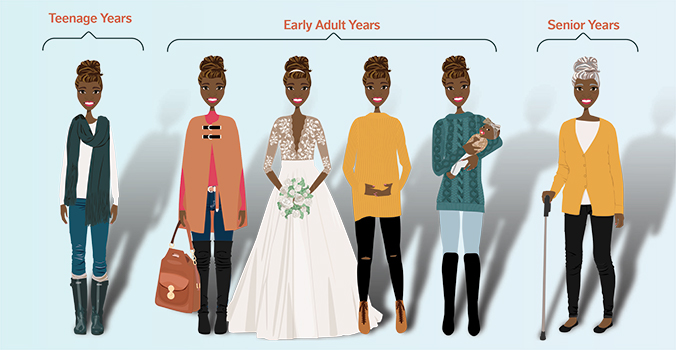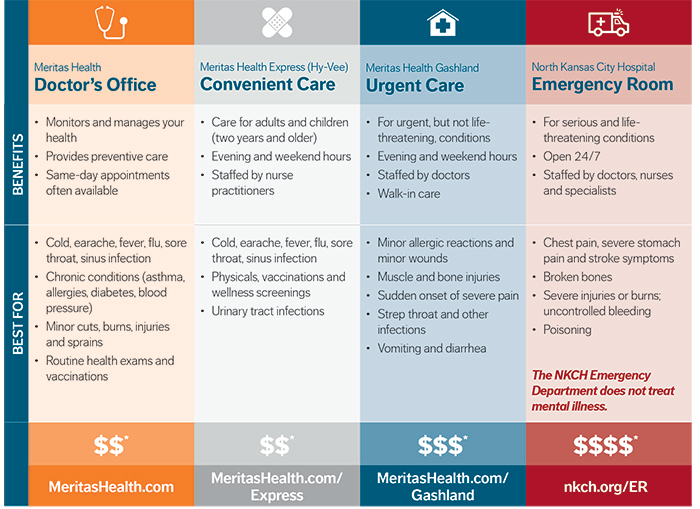Women have unique health needs that require care from a specialist like an obstetrician-gynecologist (OB-GYN). It’s important for women to regularly see an OB-GYN to support their health needs and concerns from adolescence through menopause and well beyond.
What Is an OB-GYN?
Obstetrics and gynecology are specialties often practiced together to support the variety of women’s health issues throughout every stage of life, including pregnancy. Obstetricians care for expectant women and childbirth. Gynecologists focus on women’s reproductive system functions and diseases, offer preventive care, and provide medical or surgical interventions when needed. Doctors who practice both specialties are OB-GYNs.
Teenage and Early Adult Years
The American College of Obstetricians and Gynecologists recommends young girls first visit an OB-GYN between the ages of 13-15. “This is a good time for young girls to ask questions, learn about pregnancy and sexually transmitted infection prevention, and understand their bodies better,” said Jackie Werner, MD, Club W director.
The organization encourages women to begin getting Pap smears, which screen for cervical cancer, from an OB-GYN at age 21. For most, Pap smears are only recommended every three to five years between ages 21-65.
Early adulthood is the best time for women to speak with an OB-GYN about family planning and fertility testing. Experts recommend women who want to have children become pregnant by age 35, because pregnancies after 35 are at a higher risk for complications.

Senior Years
As women age, they should visit an OB-GYN for breast and pelvic exams, menopause support, Pap smears and more. Women should begin mammograms, or breast cancer screenings, at age 40 and have one every one to two years until age 75.
“With breast cancer becoming more common, breast exams with OB-GYNs or gynecologists are crucial,” said Dr. Werner, an OB-GYN with Meritas Health Pavilion for Women. “When we find breast cancer early, it is most treatable, and the survival rate is almost 100%.”
Menopause occurs when the ovaries stop producing estrogen, naturally stopping menstrual cycles. On average, women reach menopause by age 51. Most women going through menopause experience hot flashes, sleep problems and vaginal dryness. OB-GYNs can help manage these symptoms with treatments like hormone therapy.
OB-GYNs screen for ovarian cancer with pelvic exams, where they check the pelvic area and ovaries for abnormalities. Women are most frequently diagnosed with ovarian cancer in their 60s, making pelvic exams especially valuable during this time.
Find an OB-GYN at Meritas Health Pavilion for Women or Meritas Health Obstetrics & Gynecology to receive a lifetime of health support.
Talk to Your OB-GYN
Health-related topics women can address with an OB-GYN include:
- Birth control and fertility
- Bone health
- Cancer prevention (including breast, cervical and ovarian)
- Incontinence or difficulty controlling urine
- Menstrual cycle concerns
- Mental health
- Pain or discomfort during sex
- Polycystic Ovary Syndrome
- Rashes or bumps in the pelvic area
- Sexual health and function
- Vaginal discomfort, odor or abnormal discharge
Related Articles

March 9, 2020
3 Sneaky IBS Triggers
For people with irritable bowel syndrome, spring may spark a flare-up in symptoms

June 5, 2024
5 Consejos Sobre Nutricion para un Estilo de Vida Mas Saludable
Una alimentación saludable y una nutrición adecuada desempeñan un parte importante a la hora de mantener una buena salud. Aquí le mostramos cómo mejorar sus hábitos nutricionales.

May 31, 2024
5 Nutrition Tips for a Healthier Lifestyle
Healthy eating and proper nutrition play a big part in maintaining good health. Here's how to improve your nutrition habits.


